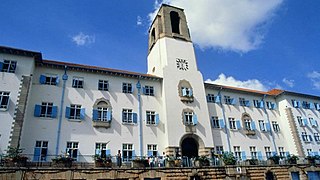
Apolo Robin Nsibambi was a Ugandan academic and politician who served as the 8th Prime Minister of Uganda from 5 April 1999 until 24 May 2011,when Amama Mbabazi succeeded him.

Indirect rule was a system of governance used by imperial powers to control parts of their empires,particularly used by colonial empires like the British Empire to control their possessions in Africa and Asia,which was done through pre-existing indigenous power structures. Indirect rule was used by various colonial rulers:the French in Algeria and Tunisia,the Dutch in the East Indies,the Portuguese in Angola and Mozambique and the Belgians in Rwanda and Burundi. These dependencies were often called "protectorates" or "trucial states". By this system,the day-to-day government and administration of areas both small and large were left in the hands of traditional rulers,who gained prestige and the stability and protection afforded by the Pax Britannica,at the cost of losing control of their external affairs,and often of taxation,communications,and other matters,usually with a small number of European "advisors" effectively overseeing the government of large numbers of people spread over extensive areas.

Makerere University is Uganda's largest and oldest institution of higher learning,first established as a technical school in 1922,and the oldest currently active university in East Africa. It became an independent national university in 1970. Today,Makerere University is composed of nine colleges and one school offering programmes for about 36,000 undergraduates and 4,000 postgraduates. These colleges include College of Natural Sciences (CONAS),College of Health Sciences (CHS),College of Engineering Art &Design (CEDAT),College of Agriculture and Environmental Studies (CAES),College Of Business and Management Sciences (CoBAMS),College of Humanities &Social Sciences (CHUSS),College of Computing and Information Sciences (COCIS),College of Veterinary Medicine,Animal Resources &Bio-security (COVAB),College of Education and External Studies (CEES) and Makerere University Business School (MUBS). In addition,Makerere has onother campus in Eastern Uganda Jinja City.
In June 1962 a conference of African literature in the English language,the first African Writers Conference,was held at Makerere University College in Kampala,Uganda. Officially called a "Conference of African Writers of English Expression",it was sponsored by the Congress for Cultural Freedom and the Mbari Club in association with the Department of Extra-Mural Studies of Makerere,whose director was Gerald Moore.
Moses Isegawa,also known as Sey Wava,is a Ugandan author. He has written novels set against the political turmoil of Uganda,which he left in 1990 for the Netherlands. His debut novel,Abyssinian Chronicles,was first published in Amsterdam in 1998,selling more than 100,000 copies and gaining him widespread national attention. It was also very well reviewed when published in English in the United Kingdom and United States,in 2001. Isegawa became a naturalized Dutch citizen,but he returned to live in Uganda in 2006.
Joe Oloka-Onyango is a Ugandan lawyer and academic. He is a Professor of Law at Makerere University School of Law where he has also formerly been Dean and Director of the Human Rights and Peace Centre (HURIPEC). He is married to Prof Sylvia Tamale,also a lawyer,academic and activist. They have two sons;Kwame Sobukwe Ayepa and Samora Okech Sanga.

European colonialism and colonization is the policy or practice of acquiring full or partial political control over other societies and territories,founding a colony,occupying it with settlers,and exploiting it economically. For example,colonial policies,such as the type of rule implemented,the nature of investments,and identity of the colonizers,are cited as impacting postcolonial states. Examination of the state-building process,economic development,and cultural norms and mores shows the direct and indirect consequences of colonialism on the postcolonial states.
The history of external colonisation of Africa can be dated back from ancient,medieval,or modern history,depending on how the term colonisation is defined.

Sylvia Rosila Tamale is a Ugandan academic,and human rights activist in Uganda. She was the first woman dean in the law faculty at Makerere University,Uganda.
Stephen Robert Isabalija,is a Ugandan civil servant,management professional,accountant,academic and academic administrator. He is the immediate past permanent secretary in the Ministry of Energy and Mineral Development in Uganda,having served in that capacity from November 2016,until his termination on 24 August 2017.
Direct colonial rule is a form of colonialism that involves the establishment of a centralized foreign authority within a territory,which is run by colonial officials. According to Michael W. Doyle of Harvard University,in a system of direct rule,the native population is excluded from all but the lowest level of the colonial government. Ugandan academic Mahmood Mamdani classifies direct rule as centralized despotism:a system where natives were not considered citizens.

Stella Nyanzi is a Ugandan human rights advocate,poet,medical anthropologist,feminist,queer rights advocate,and scholar of sexuality,family planning,and public health. She was arrested in 2017 for insulting the Ugandan president. In January 2022,she was accepted to live in Germany on a writers-in-exile programme run by PEN Germany,with her three children.
Student activism and politics was a significant part of Ugandan higher education in the 20th century. Beginning in the 1930s,Ugandan universities and secondary schools were a center for revolutionary movement. For three decades,most youth movements focused on independence from the British Empire. Following independence in 1962,activist groups shifted focus internally. Student leadership groups at universities around Uganda,especially Makerere University,were politically affiliated and elections for student government were closely tied to political standing. Student activist groups were key opposition against the regimes of Milton Obote and Idi Amin,and students were especially targeted for persecution during Amin's presidency. During Yoweri Musevini's presidency,students have been leading critics,participating in large protests both preceding and following Musevini's move to eliminate presidential term limits in 2006. Consistent opposition to President Yoweri Musevni culminated in three shutdowns of Makerere University.
Namubiru Rose Kirumira. is a Ugandan sculptor and senior lecturer at the Margaret Trowell School of Industrial and Fine Arts (MTSIFA),Department of Visual Arts,College of Engineering Design Art and Technology,at Makerere University. She specializes in human form,sculpted wood,clay and concrete monumental sculptures. Her works include the statue King Ronald Mwenda Mutebi where she assisted the sculptor and professor Francis Nnaggenda at Bulange Mengo,and Family at Mulago Hospital in Kampala.

Zohran Kwame Mamdani is a Ugandan-born American Democratic Socialist politician. He is the assembly member for the 36th district of the New York State Assembly,in Queens. Mamdani was elected after defeating incumbent Democrat Aravella Simotas in the 2020 primary.

Turkey has an embassy in Kampala. Uganda has an embassy in Ankara.
Marilyn ('Lyn') Ossome is an academic,specialising in feminist political theory and feminist political economics. She is currently Senior Research Associate of at the University of Johannesburg and a member of the advisory board for the Strategic Initiative for Women in the Horn of Africa,amongst other accolades. She is an editorial board member of Agrarian South:Journal of Political Economy,and in 2021,she co-edited the volume Labour Questions in the Global South. She serves on the executive committee for the Council for the Development of Social Science Research in Africa (CODESRIA). She is the author of Gender,Ethnicity and Violence in Kenya’s Transitions to Democracy:States of Violence.

Neither Settler nor Native:The Making and Unmaking of Permanent Minorities is a 2020 book by Ugandan political theorist Mahmood Mamdani. Mamdani argues that nationalism and colonialism have common origins and are two sides of the same coin. He argues for responding to the violence inherent in the nation-state by rejecting the identities of settler and native and participating as equal citizens instead.
Sam Moyo (1954–2015) was a Zimbabwean scholar and land reform activist,the co-founder and executive director of the African Institute for Agrarian Studies (AIAS),and President of the Council for the Development of Social Science Research in Africa (CODESIRA). He was a research professor at the Zimbabwe Institute of Development Studies,and taught at the University of Zimbabwe.

Archibald Boyce Monwabisi Mafeje,commonly known as Archie Mafeje,was a South African anthropologist and activist. Born in what is now the Eastern Cape,he received degrees from the University of Cape Town (UCT) and the University of Cambridge. He became a professor at various universities in Europe,North America,and Africa. He spent most of his career away from apartheid South Africa after he was blocked from teaching at UCT in 1968.










